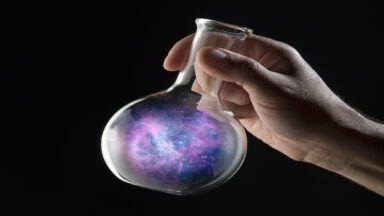Are Alien Abductions Simply the Result of Lucid Dreams?

Could some alien abduction encounters actually be lucid dreams? The latest research on the phenomenon in a new report out of Russia hints at just that. Researchers at The Phase Research Center in Russia sought to find out in a new study recently published in the International Journal of Dream Research.
A lucid dream is a dream where the person knows they are dreaming while they are still in the dream. In the study, 152 volunteers of experienced lucid dreamers were prompted to experience aliens and UFOs in their lucid dreams—of those, 75 percent had alien and UFO encounters in a lucid dream, 61 percent said they had encountered alien-like creatures, and 28 percent said they encountered UFOs.
For the lead researcher and founder of The Phase Research Center, Michael Raduga, there was a personal connection to this study.
“It happened more than 20 years ago, I believed I experienced a typical alien abduction story; I was abducted,” he said. “It happened upon awaking, with sleep paralysis, with a lot of fear, levitating, and so on. And I believed in this for two years, but then I started to practice lucid dreams and out-of-body travels, and it helped me to understand that all the time I was experiencing the same thing.”
Watch more:
Nordic Aliens: What We Know About These Extraterrestrials

Ancient civilizations around the world have spoken of angelic beings that descended from the sky, sent by God to assist humanity by sharing their spiritual and emotional wisdom with Earthlings. These mythological entities appear to continue their mission to this day, and many believe they are emissaries from outer space, an extraterrestrial species known as the Nordic or Pleiadian race.
What are Nordic Aliens?
The Nordics are an ancient alien species that have been reported in contact with various civilizations throughout history. Claims suggest they may have been interacting with early human societies, perhaps influencing ancient cultures under the guise of gods or advanced beings. Initially, they identified themselves as being from Venus and later from the Pleiades star cluster. However, their true origin remains a subject of debate, and they may prefer to keep their true home a secret for security reasons.
Mythology and History
Nordic aliens, also known as Tall Whites and Space Brothers, are thought to be angelic beings represented in many religions and ancient civilizations, such as the following:
- Some researchers suggest these extraterrestrial beings may have visited ancient Mesopotamia, influencing Sumerian culture with their advanced knowledge.
- Ancient Egypt’s advanced astronomical and engineering skills, along with depictions of tall, fair-skinned beings, hint at possible Nordic alien influence.
- Ancient Greek mythology’s descriptions of gods and demigods resemble the physical traits attributed to these beings, further suggesting early encounters.
- Viking folklore and Norse mythology describe gods with characteristics akin to those of Nordic aliens, suggesting visits to ancient Scandinavia.
- Indigenous cultures in the Americas, such as the Hopi tribe, have prophecies of “True White Brothers,” while Mesoamerican legends speak of white-skinned gods.
- Ancient Indian texts describe fair-skinned deities and advanced flying machines, potentially linked to Nordic aliens.
Common Nordic Aliens
Nordic aliens are often described in various ways based on their appearances and the traits attributed to them. Here are some commonly mentioned types:
Hopi
The Hopi people, an indigenous group in North America, have legends about various star beings or ancestors. Some interpretations suggest that these beings were tall and fair-skinned, similar to the Nordic archetype. These peaceful entities are believed to be the True White Brothers, foretold in Hopi prophecy, signaling the end of the fourth age.
Vril Society
The Vril Society is a controversial and often debated topic in ufology and occult circles. This secret society, reportedly active in the early 20th century in Germany, was said to be interested in advanced technology and hidden knowledge. While generally seen as a benevolent species, there’s a chance the Nordics influenced the Vril Society. Some factions might have deviated from the path of light, aligning with malevolent entities opposing the human race.
Agarthans
Agartha is a mythical realm said to exist within the Earth’s hollow interior. In this context, Agarthan Nordics are described as residing in this hidden world and possessing advanced technology and knowledge. They are often portrayed as having tall stature and fair features.
Pleiadians
Pleiadian Nordics are among the most well-known in contemporary UFO and New Age literature. They are said to come from the Pleiades star cluster, which is a group of stars located about 400 light-years from Earth. Descriptions of Pleiadian Nordics typically include tall, attractive individuals with blonde hair and blue eyes who are benevolent and advanced. They are often described as being involved in guiding humanity, offering spiritual guidance, or even intervening in global issues to help prevent disasters or promote peace.
Venusians
Venusian Nordics are claimed to come from Venus, one of Earth’s neighboring planets. This type of Nordic is often depicted similarly to other Nordics but with some slight differences in their physical appearance or technology, reflecting their planetary origin. Reports of Venusian Nordics often focus on their advanced knowledge and technology, as well as their interest in interacting with or guiding humanity.
Each of these types reflects the varied ways in which different cultures and speculative traditions interpret the concept of Nordic aliens.
Characteristics
Nordic alien descriptions can differ, but the following points provide a consistent overview of their characteristics.
Physical Appearance
Nordics are perhaps the most human-like in appearance of all the different types of aliens and closely resemble people of Scandinavian descent. They tend to have reddish to blond hair and green or blue eyes and stand anywhere from 5 to 7 feet tall. Some claim that Nordics lack irises and wear contact lenses to blend in when visiting our planet. Many also claim that these beings lack a sense of smell. Nordics are also claimed to be fourth- and fifth-density beings.
These descriptions are commonly associated with UFO sightings and abduction phenomena within European nations such as Denmark, Germany, Iceland, Norway, and Sweden.
They can easily pass as Earthlings and those who have been in contact with this alien race state that their appearance allows them to freely explore our planet.
They can easily pass as Earthlings and those who have been in contact with this alien race state that their appearance allows them to freely explore our planet.
Modes of Transportation
Nordics are generally observers, sometimes viewing events and contactees from within their spacecraft, which range from spherical to cigar-shaped.
Communication Methods
As part of the Galactic Federation, Nordics generally maintain a distance from humanity, often communicating telepathically or through dreams. However, some Nordics have been known to actively intervene in human affairs, influencing events and guiding individuals in more direct ways.
Intentions on Earth
Many contactees have reported receiving channeled messages of peace and love from Nordics, with much of the available information about these beings coming through such communications. Nordics are deeply concerned with the spiritual evolution of humanity and often emphasize that while humans are at a less advanced stage of development, we are closely related to them. This concern has led some Nordics to more directly influence human affairs, guiding and assisting us as we progress.
Notable Abductees
This species is less frequently associated with alien abduction experiences, and when involved in such episodes, there is generally a message of peace and concern relating to the Earth’s wellbeing.
Travis Walton
One of the most notable and intriguing cases of Nordic abduction that occurred in North America was the Travis Walton case.
Walton was working as a logger in Arizona when he came across a hovering alien craft with his lumber crew and was knocked unconscious by a beam of light emanating from the object.
Walton was working as a logger in Arizona when he came across a hovering alien craft with his lumber crew and was knocked unconscious by a beam of light emanating from the object.
He was taken aboard, where he encountered several types of beings, including a Nordic-like race of tall, white humanoids. The craft released him after five days, and the subsequent story became a news sensation. Walton shared his experiences in his book The Walton Experience, which became the basis for the 1993 film Fire in the Sky.
Billy Meier
Other notable contactees include Billy Meier, a Swedish farmer who claims to have been in contact with the Plejarans, a Nordic extraterrestrial race. Throughout his life, he has photographed, filmed, and been in contact with these beings, delivering their messages of peace and love to humanity.
George Adamski
George Adamski was another early Nordic contactee of the 1950s and claimed to be in contact with a group of Nordic aliens from Venus. He wrote several books on the subject and said that his materials were cleared by the FBI and the United States government.
President Eisenhower
It is also rumored that President Eisenhower had a secret meeting with a group of Nordic extraterrestrials who were attempting to convince the United States to disarm its nuclear missile program in exchange for advanced technology. The event is said to have taken place in February 1954 at Edwards Air Force Base under the guise of Eisenhower undergoing emergency dental surgery. It is believed that this meeting did not end with any sort of agreement.
Instead, Eisenhower is thought to have entered into a treaty with the Grey aliens, a pact ensuring that the United States could keep its nuclear arsenal while still receiving advanced technologies from the ETs. In exchange for this technological intel, the Greys would be allowed to abduct and experiment upon the American people without question.
Harmony and Stewardship
The message that seems to follow each encounter with the Nordic species is the importance of spiritual awareness and the stewardship of our planet. According to the Nordics, humans are a closely related species, and the human ascension process involves learning how to overcome our differences to live as one in harmony. Do you think humanity is close to realizing our collective ascension, or do you feel that extraterrestrial intervention is a necessary step in our evolution? Or is this all an intriguing hoax? You decide.
Learn more about extraterrestrials by exploring Gaia’s collection of alien documentaries and docuseries.




































